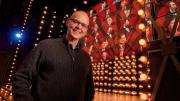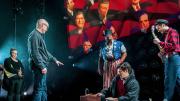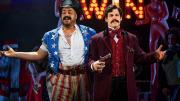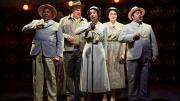While John Wilkes Booth looks on with something like fatherly pride, Lee Harvey Oswald kneels in the Texas Book Depository and sights the scope of a rifle, right at James Bundy ’81, artistic director of the Yale Repertory Theatre and dean of the Yale School of Drama (YSD). Bundy’s default expression—genial, watchful—doesn’t change. He’s directing a rehearsal of Assassins, the springproduction of the Yale Rep’s fiftieth anniversary season. The musical, by Stephen Sondheim and John Weidman ’68, brings nine attempted and successful killers of U.S. presidents together in a hallucinatory revue. The gun’s a period-appropriate prop; the “scope,” though, is made from a disposable paper cup wound in masking tape.
“What’ll we do without these?” grins the actor playing Oswald.
“He’s teasing me,” explains Bundy. “We’re cutting cups from the budget next year.” At the exaggerated outcry, he continues, “It’s a big sustainability measure. We’re going to save $2,000. And a tree!”
Today is mostly devoted to combat: teaching the actors how to handle their prop weapons in a way that looks realistic, and how to scrap and scuffle in a way that is safe. The fight choreographer goes through a few options for blocking the scene. Oswald could throw the rifle back to Booth like this, or he could hand it back like that, the way Oswald’s U.S. Marine training would have taught him—“it all depends on what the boss wants.”
Mostly, the boss listens—legs crossed, chin in hand—and during the six hours of rehearsals on this late February afternoon, he gives nary a “no.” What if, in this number, the narrator gets lifted into the air by the throat? “Try it!” What if, in that song, the murderer gets blocked from the microphone? “Sure, let’s try it.” When Charles Guiteau manhandles Sara Jane Moore, should he grope her left or right side? Bundy considers the audience’s perspective. “It should be her right, for storytelling.” The next day—for storytelling—they head to a local gun range, so the actors can learn how it really feels to shoot.
Bundy’s pedigree—familial and professional—feels like the natural outgrowth of Harvard and Yale’s entwined institutional histories. In 1925, English professor George Pierce Baker left Harvard, taking his playwriting course with him, to found the Yale School of Drama; in 1980, YSD dean and Yale Rep founding director Robert Brustein reversed the trip, decamping for Cambridge to start the American Repertory Theater. Bundy’s grandfather and paternal uncles were all Yalies, as was his father, McGeorge Bundy, JF ’48, LL.D. ’61, who was the dean of the Faculty of Arts and Sciences at Harvard before serving in the Kennedy administration. James was a senior at Groton, applying to conservatories and intending to study acting, when “My parents arranged for me to speak to Robert Brustein,” he recalls, with a faintly embarrassed laugh. “He made a very cogent case. He said all of the interesting artists he knew had great educations, and that there was plenty of time to train after I went to college.” Bundy matriculated at Harvard, “a very desultory English major” who got deep into the College’s drama scene, acting under the now acclaimed director Peter Sellars ’80 and staging Brendan Behan’s The Hostage and Tom Stoppard’s Albert’s Bridge.
“I knew I was a skilled actor and I could do the work, but I also knew I was a balding 24-year-old—well, actually, by that time I was 29, and even balder.”
After graduation, he trained as an actor at the London Academy of Music and Dramatic Arts, and for five years took roles in various productions in California and Oregon. But he began to sense his limits as a performer: “I knew I was a skilled actor and I could do the work, but I also knew I was a balding 24-year-old—well, actually, by that time I was 29, and even balder.”
In 1989, toward the end of his acting career, Bundy was playing Feste in the Oregon Shakespeare Festival’s (OSF) Twelfth Night when his friends Bill Rauch ’84 and Alison Carey ’82 came to town with their traveling ensemble, the Cornerstone Theater Company. Taking the chance to transition to arts leadership, he joined the board and became managing director. “It was a really vital two years,” says Rauch, during which Bundy opened the group’s office in New York City and produced its 10,000-mile national tour.
But he found himself in a depressive spiral. After he and his wife, actress and singer Anne Tofflemire, had their first child, “I discovered being in the office was no good for me,” he told the audience at a Yale event celebrating the Rep’s anniversary last September. “And it became clear to me—in a therapeutic context, frankly—that I wasn’t going to be a good parent if I couldn’t be in an artistic environment.” They moved to New Haven so Bundy could pursue his master of fine arts in directing. Then and now, it was unusual for students to have young families. “The prerequisite for being a graduate student at Yale with children is having a spouse who is a saint,” he says. “My wife did the lion and a half’s share of the childcare.”
After earning his degree in 1995, Bundy worked at The Acting Company in New York, and then as the artistic director of the Great Lakes Theater Festival in Cleveland, where he lowered debt, raised attendance, and started a new educational program. In 2001, six years after he graduated from Yale, Bundy—noticeably young, and still a relative unknown in the theater world—succeeded his mentor Stan Wojewodski Jr. as dean and artistic director. The search had been public and difficult, with rumors flying anytime a big name in regional theater came to New Haven for lunch. Its dual responsibilities made the position particularly tough to fill: “I know people who wouldn’t touch that job,” says Chris Arnott, longtime theater critic at the New Haven Register and Hartford Courant. Few people had the appetite to wrangle theater professionals and academics and donors, run a school, teach students, and direct shows. What’s more, Yale was going through a difficult period: as with many drama schools at the time, enrollment was down; so was theater attendance.
It did take time to adjust to the institution’s split focus, Bundy acknowledges. While discussing technical notes for a Yale Rep show, he’d suddenly realize that three-quarters of the room was thinking about the homework that awaited them after rehearsal, and the classes they had to wake up for the next morning. “I would actually argue that if you’re going to run the best school in the nation, that school has to be in charge of a professional theater,” he says. “If you were going to run the absolute best professional theater in the nation, I think you probably wouldn’t commit to running it with a school.”
Both institutions have grown during his tenure. More students receive financial aid; at the theater, compensation doubled. So did the amount spent on productions, reports Rep managing director and YSD deputy dean Victoria Nolan: “The scale of our work grew exponentially, in a good way.” The school has also gained a new department for projection design, and Bundy drew the largest gift in YSD history, $18 million, to finance the Binger Center for New Theater, which commissions and develops plays. “We’ve had great deans and great artistic directors,” says Sterling Professor of theater and English Joseph Roach, who headed the search committee, “but some of the incumbents have favored one role or another.” Bundy somehow made it all seem like one job. And while his predecessors (like U.S. presidents) typically have served two terms, he was named to his fourth last fall.
“I hesitate to use the word ‘politician,’ but he is a great politician. James gets actors to do what he wants with very little direction. At Yale, he got us to do what he wanted in three words or less almost every time.”
Colleagues describe Bundy as hyper-articulate and humble, easy to work with. But his most useful gift, both as an administrator and as an artist, might be his eye for talent. “He’s got a real sense of pageantry, including getting important actors and giving them challenges,” says Arnott, the theater critic. “He takes people seriously when they talk idly about a project they’d like to do.” “He was really masterful with dealing with people,” James Bland, an actor in Bundy’s M.F.A. thesis show, told the Yale Daily News in 2001. “I hesitate to use the word ‘politician,’ but he is a great politician. James gets actors to do what he wants with very little direction. At Yale, he got us to do what he wanted in three words or less almost every time.”
Rauch, who has collaborated with Bundy throughout their respective tenures at Yale and OSF, calls him “one of the kindest people in the American theater. He’s such a gentle communicator. He’s so kind and so clear about what he wants and what he needs.” Beyond that, Bundy can also identify the same thing in others. Back in 1999, when Rauch was still creating community theater with amateur casts over at Cornerstone, Bundy invited him to Cleveland to stage any play Rauch wanted, with an all-professional cast. “And I burst into tears,” recalls Rauch. “He knew what I needed before I knew.”
Straddling as it did both sides of the 2016 election, the Rep’s current season was always designed to be topical. But the present has its own funny way of catching up. The fall opener was the world premiere of Scenes from Court Life, in which playwright Sarah Ruhl remixed Stuart-era England with the United States under the Bush family; the work was conceived when the electoral field seemed primed for a duel between their dynasty and the Clintons. When Donald Trump won the Republican nomination, Bundy says, “in a way, it turned into sort of an elegy for decency.” The play was Ruhl’s fourth to debut at Yale. As August Wilson was for former YSD dean and director Lloyd Richards (himself described by The New York Times as “one of the most influential figures in modern American theater”), Ruhl—piquantly romantic, slyly witty—may become the writer most associated with Bundy’s tenure. He remembers reading her play Eurydice, start-to-finish, while standing in his kitchen: “It was pretty undignified, because by the end of it, I was sobbing onto my butcher block!”
Political upheaval may have given Ruhl’s satiric portrait of the ruling class a sepia-toned pathos, but Assassins repels nostalgia; its pack of lone wolves howl their underdog delusions, andrefuse to be put down by history. Since its 1990 premiere, its funhouse reflection of the American dream has only grown clearer, and more disturbing. “I believed at the time when we were programming it that it would be relevant by the time we produced it,” says Bundy. “Either because President Hillary Clinton would be enduring the worst backlash in the history of backlash, from disenfranchised white men whose sense of entitlement led to a kind of enraged hostility. Or that we would actually be governed by the ethos of enraged, disenfranchised white men.”
Somewhere on the slippery spectrum between Everyman and bogeyman, the actors have to trigger the spine-chill of recognition in the audience—this is what goes bump in the national night—and Bundy has to help shape their performances. In late February, the cast was reviewing the number “How I Saved Roosevelt,” in which FDR’s would-be murderer Giuseppe Zangara gets strapped to an electric chair, singing a deranged tarantella. The song ended, and Bundy quietly conferred with the actor playing Zangara. Afterward the performance was perfectly modulated: less bug-eyed, his grin’s wattage turned down.
The other challenge comes with the genre. “Musicals are simply more densely packed,” Bundy explains. Compared to straight plays, they require a director to work with collaborators—the choreographer and musical director—with far greater creative input. “It’s unbelievably fun and gratifying to be able to turn to more people and say, ‘What do you think about that?’” he says. “It’s simultaneously a greater level of coordination, but the tradeoff is, you have that many more terrific minds at work.”
Assassins is Bundy’s first musical. Then again—as with his dual job at Yale—what other people might see as a daunting array of competing priorities, he sees as getting to have it all. Asked if he wants to direct more musicals in the future, Bundy blurts, “Oh God! Oh, yes! I can’t wait until I direct the next one. I’m having such a good time.” He hasn’t dared to allow himself a wish list of possible shows just yet. “I guess maybe I—I’m conflicted about getting to do so many things that I like to do.” A few weeks into the rehearsal process, he reports, “I’m having a hard time managing the level of fun I’m having, because it’s so pleasurable.”












